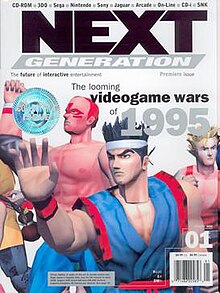Next Generation (magazine)

The cover of the January '95 issue of Next Generation.
|
|
| Frequency | Monthly |
|---|---|
| First issue | January 1995 |
| Final issue — Number |
January 2002 Volume 4, No. 13 |
| Company | Imagine Media |
| Country | United States |
| ISSN | 1078-9693 |
Next Generation (also known as NextGen) was a video game magazine that was made by Imagine Media publishing company (now Future Network USA). It was affiliated to and shared editorial with the UK's Edge magazine. Next Generation ran from January 1995 until January 2002. It was published by Jonathan Simpson-Bint and edited by Neil West. Other editors included Chris Charla, Tom Russo, and Blake Fischer.
Next Generation initially covered the 32-bit consoles: 3DO, Atari Jaguar, and the still unreleased Sony Playstation and Sega Saturn. Unlike competitors GamePro and Electronic Gaming Monthly, the magazine was directed towards a different readership by focusing on the industry itself rather than individual games.
The magazine was first published by GP Publications up until May 1995 when the publisher was acquired by Imagine Media.
In September 1999, Next Generation was redesigned, its cover name shortened to simply NextGen. This would start what was known as "Lifecycle 2" of the magazine. A year later, in September 2000, the magazine's width was increased from its standard 8 inches to 9 inches, however this wider format lasted less than a year. Subscribers of Next-Gen Magazine received issues of PlayStation Magazine when the magazine's life-cycle was terminated.
The brand was resurrected in 2005 by Future Publishing USA as an industry-led website, Next-Gen.biz. It carries much the same articles and editorial as the print magazine, and in fact reprints many articles from Edge, the UK-based sister magazine to Next-Gen. In July 2008, Next-Gen.biz was rebranded as Edge-Online.com.
Next Generation's content didn't focus on screenshots, walkthroughs, and cheat codes. Instead the content was more focused on game development from an artistic perspective. Interviews with people in the game industry often featured questions about gaming in general rather than about the details of the latest game or game system they were working on.
...
Wikipedia
